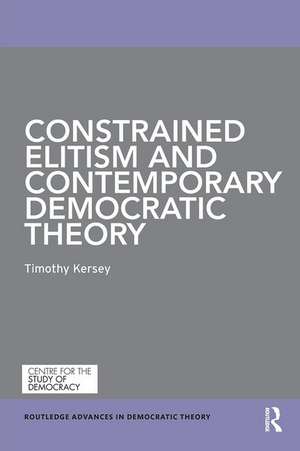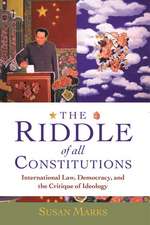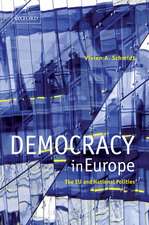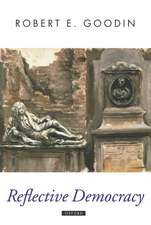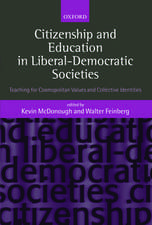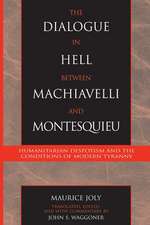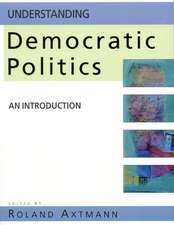Constrained Elitism and Contemporary Democratic Theory: Routledge Advances in Democratic Theory
Autor Timothy Kerseyen Limba Engleză Paperback – 24 ian 2018
Timothy Kersey’s book asserts that the widespread utilization of internet communications technologies, especially social media applications, has brought forth a variety of new communicative behaviors and relationships within liberal polities. Through quick and seemingly chaotic streams of networked communication, the actions of these elites are subject to increasingly intense scrutiny and short-term pressure to ameliorate or at least address the concerns of segments of the population. By examining these new patterns of behavior among both elites and the general public, Kersey unearths the implications of these patterns for contemporary democratic theory, and argues that contemporary conceptualizations of "the public’" need to be modified to more accurately reflect practices of online communication and participation.
By engaging with this topical issue, Kersey is able to closely examine the self-organization of both elite and non-elite segments of the population within the realm of networked communication, and the relations and interactions between these segments. His book combines perspectives from political theory and communication studies and so will be widely relevant across both disciplines.
| Toate formatele și edițiile | Preț | Express |
|---|---|---|
| Paperback (1) | 425.59 lei 6-8 săpt. | |
| Taylor & Francis – 24 ian 2018 | 425.59 lei 6-8 săpt. | |
| Hardback (1) | 1050.78 lei 6-8 săpt. | |
| Taylor & Francis – 27 ian 2016 | 1050.78 lei 6-8 săpt. |
Din seria Routledge Advances in Democratic Theory
-
 Preț: 107.16 lei
Preț: 107.16 lei -
 Preț: 326.14 lei
Preț: 326.14 lei -
 Preț: 286.80 lei
Preț: 286.80 lei -
 Preț: 407.57 lei
Preț: 407.57 lei -
 Preț: 444.08 lei
Preț: 444.08 lei -
 Preț: 439.78 lei
Preț: 439.78 lei -
 Preț: 416.22 lei
Preț: 416.22 lei -
 Preț: 412.37 lei
Preț: 412.37 lei -
 Preț: 381.98 lei
Preț: 381.98 lei - 5%
 Preț: 344.60 lei
Preț: 344.60 lei -
 Preț: 386.00 lei
Preț: 386.00 lei -
 Preț: 425.59 lei
Preț: 425.59 lei -
 Preț: 388.52 lei
Preț: 388.52 lei
Preț: 425.59 lei
Nou
Puncte Express: 638
Preț estimativ în valută:
81.43€ • 85.03$ • 67.40£
81.43€ • 85.03$ • 67.40£
Carte tipărită la comandă
Livrare economică 04-18 aprilie
Preluare comenzi: 021 569.72.76
Specificații
ISBN-13: 9781138486430
ISBN-10: 1138486434
Pagini: 136
Ilustrații: 10
Dimensiuni: 152 x 229 x 7 mm
Greutate: 0.2 kg
Ediția:1
Editura: Taylor & Francis
Colecția Routledge
Seria Routledge Advances in Democratic Theory
Locul publicării:Oxford, United Kingdom
ISBN-10: 1138486434
Pagini: 136
Ilustrații: 10
Dimensiuni: 152 x 229 x 7 mm
Greutate: 0.2 kg
Ediția:1
Editura: Taylor & Francis
Colecția Routledge
Seria Routledge Advances in Democratic Theory
Locul publicării:Oxford, United Kingdom
Public țintă
PostgraduateCuprins
Introduction 1. Two Approaches to Elite Dominance 2. A Theory of Constrained Elitism 3. The Contemporary Networked Public Sphere 4. Constraint in the Networked Public Conclusion Conclusion
Notă biografică
Timothy Kersey is part-time Assistant Professor of Political Science at Kennesaw State University. He received his Ph.D. in political science from Indiana University in 2011. His research interests include contemporary democratic theory, comparative political behavior, and the social and political effects of technology.
Recenzii
'There is no shortage of talk about the impact of the internet on democracy. Yet very little of this debate has seriously engaged with contemporary democratic theory. By developing an original theoretical framework for understanding new forms of communication and public participation, this book brings together previously insular perspectives in a way that both political theorists and communication scholars should welcome.' - Kari Karppinen, University of Helsinki, Finland
'Constrained Elitism makes a valuable contribution to the conceptualization of the liberal public sphere in relation to contemporary communicative practices. It offers a considered, informative, and persuasive account of how today’s networked communications are helping to shape relationships between and amongst elites and non-elites within liberal democratic political systems. The central contribution of the book is to provide a general model of how networked communications are on the one hand enhancing the self-organizational capacity of publics, with the effect of increasing the pressure on elites by non-elite groups to address the latter’s concerns, and on the other hand providing a means for advancing the competitive advantage of particular elites.' - Lincoln Dahlberg, University of Queensland, Australia
'Constrained Elitism makes a valuable contribution to the conceptualization of the liberal public sphere in relation to contemporary communicative practices. It offers a considered, informative, and persuasive account of how today’s networked communications are helping to shape relationships between and amongst elites and non-elites within liberal democratic political systems. The central contribution of the book is to provide a general model of how networked communications are on the one hand enhancing the self-organizational capacity of publics, with the effect of increasing the pressure on elites by non-elite groups to address the latter’s concerns, and on the other hand providing a means for advancing the competitive advantage of particular elites.' - Lincoln Dahlberg, University of Queensland, Australia
Descriere
Timothy Kersey’s book asserts that the widespread utilization of internet communications technologies, especially social media applications, has brought forth a variety of new communicative behaviors and relationships within liberal polities. Through quick and seemingly chaotic streams of networked communication, the actions of these elites are subject to increasingly intense scrutiny and short-term pressure to ameliorate or at least address the concerns of segments of the population. By examining these new patterns of behavior among both elites and the general public, Kersey unearths the implications of these patterns for contemporary democratic theory, and argues that contemporary conceptualizations of "the public’" need to be modified to more accurately reflect practices of online communication and participation.
